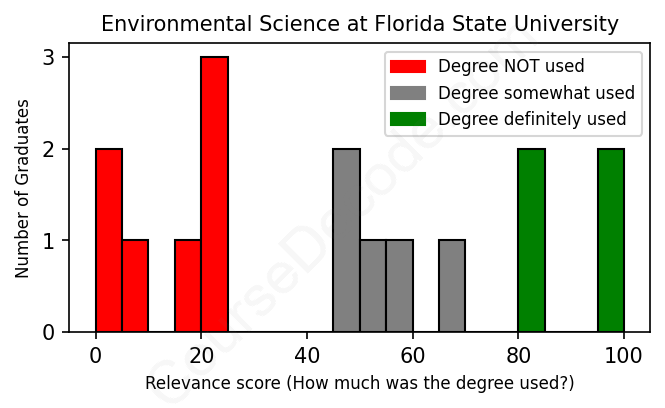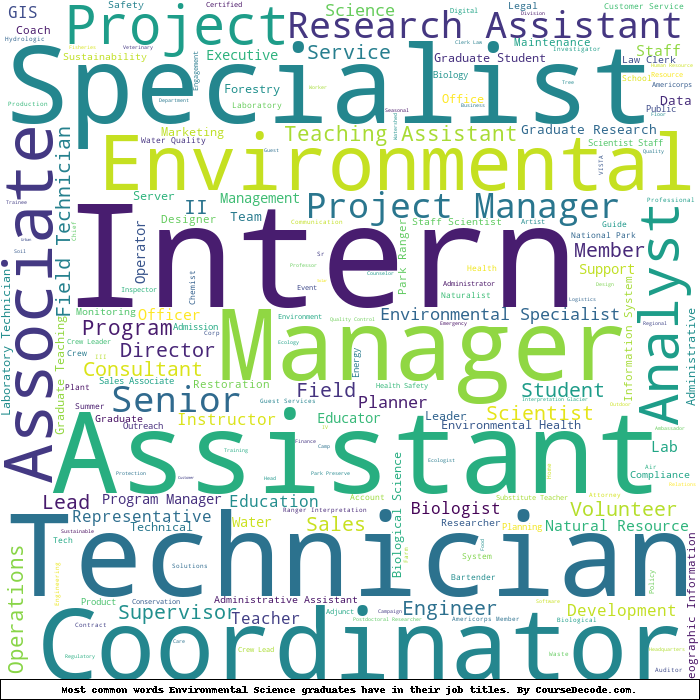
First, some facts. Of the Environmental Science graduates from Florida State University we've analyzed , here's how many have used (or NOT used) their degree in their career:

These are estimates based on AI analysis of 16 LinkedIn profiles (see below).
The verdict? Bad. Overall, with an average relevance score of 45%, Environmental Science graduates from Florida State University have a substantially lower likelihood (-22%) of finding work in this field compared to the average graduate across all fields:
And for comparison, here's the chart for all profiles we've looked at across all degrees.
Also, after graduating, 50% of these graduates have pursued further education other than another Bachelor's degree (such as a Masters degree or other), compared to the average across all profiles of 35%. This suggests you may need more than just a Bachelors degree to be competitive as a Environmental Science graduate.
See the details:
|
Relevance score: 49% We think this person has gone into a career only somewhat relevant to their degree. We think this person has gone into a career only somewhat relevant to their degree.
DEGREE INFOGraduated in 2020 from Florida State University with a Bachelor of Science - BS in Environmental Science. No other secondary education since. JOB HISTORY SINCE GRADUATIONFood And Beverage Supervisor Vail Resorts Nov 2020 - May 2022 Crew Member  Trader Joe's Aug 2022 - Aug 2023 Americorps Member  Teton Science Schools Aug 2023 - Nov 2023 Front Desk Representative  Elk Country Inn Nov 2023 - Present Nordic Ambassador  U.S. Forest Service Dec 2023 - Present ABOUTNo information provided. |
The top 10 most common jobs done by the graduates we've analyzed (ranked most common to least) are:
From the analysis of LinkedIn profiles of Florida State University graduates with a degree in Environmental Science, it's clear that the most common jobs held by these individuals span a broad range of fields, not all directly related to environmental science. Some notable roles include positions at the Florida Department of Environmental Protection, such as Environmental Scientist and Environmental Specialist, which are closely tied to their area of study. Other profiles showcase an array of occupations, including teaching, banking, real estate, and various administrative roles, many of which are less relevant to environmental science. It's interesting to see that while some graduates have landed environmentally-focused jobs, a significant number have veered off into sectors like finance, education, and customer service.
Overall, it seems that a good portion of these graduates have ended up in roles that do funnel some of their environmental knowledge, like those in governmental or consulting positions. However, plenty of others are in positions where their environmental science degree doesn't come into play, which suggests that while the degree provides some foundational knowledge, it doesn't always translate directly into job relevance. This mix of outcomes highlights the idea that, while a degree can set the stage, the pathways taken can vary widely, with many graduates finding themselves applying their skills in unexpected ways or entirely different fields.
Here is a visual representation of the most common words in job titles for Environmental Science graduates (this is across all Environmental Science graduates we've analyzed, not just those who went to Florida State University):

Looking at the career paths of graduates with a degree in Environmental Science from Florida State University, it seems like there’s a mix of both traditional and non-traditional trajectories. Right out of college, many of these grads land jobs related to environmental science, such as working as environmental scientists or specialists with state departments, internships with agencies like NASA, or positions that involve some environmental focus. For example, graduates from 2012 and 2016 got roles with the Florida Department of Environmental Protection, which is a solid start in the field. However, some seem to have veered off into positions that are less directly tied to environmental science, such as sales and business roles, especially for those who graduated in 2014 and 2018.
As time goes on, some graduates do manage to stay in the environmental sector, taking on more advanced roles like Environmental Specialist or even getting involved in specialized areas like hydrology or environmental planning. However, it’s noticeable that others have drifted further away from the core of environmental science, moving into management or sales positions unrelated to their degrees. Five to ten years later, while some have carved out successful niches in environmental roles, others have wound up in fields that, honestly, don't use their Environmental Science background at all. So, the outcomes are quite mixed—some find fulfilling careers relevant to their studies, while others may end up in jobs that feel disconnected from their original passion for the environment. It's really a matter of how proactive they were in shaping their career paths after graduation.
Honestly, a Bachelor’s degree in Environmental Science can be pretty challenging, but it really depends on your interests and strengths. At Florida State University, you’ll dive into a mix of subjects like biology, chemistry, and even some social sciences, which can get a bit tough if those aren’t your jam. Plus, there are often fieldwork and lab components that require hands-on involvement, which might feel a bit more demanding than typical lecture classes. If you’re passionate about the environment and are willing to put in the effort, you can definitely make it through, but don’t underestimate the workload! It's probably around average in terms of difficulty; it can definitely be a rewarding experience if you embrace it.
Most commonly, in the LinkedIn profiles we've looked at, it takes people 4 years to finish a Bachelor degree in Environmental Science.
Looking at these graduates from Florida State University, it seems like some of them have landed pretty solid jobs with decent income, especially those who started their careers in environmental or academic roles, like the Environmental Specialist or Assistant Professor positions. However, others have bounced around a bit or started in less traditional paths, like retail or food service, which are typically lower-paying. A few individuals who moved into management roles in institutions or became business owners also likely found better financial stability. So, while some of these folks are probably doing well, others might be making more modest salaries, especially at the start of their careers. Overall, it’s a mixed bag, and it really depends on the specific path they chose after graduation.
Here is a visual representation of the most common words seen in the "about" section of LinkedIn profiles who have a Bachelor degree in Environmental Science (this is across all Environmental Science graduates we've analyzed, not just those who went to Florida State University). This may or may not be useful:

Here are all colleges offering a Bachelor degree in Environmental Science (ordered by the average relevance score of their Environmental Science graduates, best to worst) where we have analyzed at least 10 of their graduates:
| College | Score | Count |
|---|---|---|
 University of North Carolina at Chapel Hill University of North Carolina at Chapel Hill
|
87 | 10 |
 The Ohio State University The Ohio State University
|
85 | 12 |
 University of Vermont University of Vermont
|
68 | 13 |
 University of Oregon University of Oregon
|
66 | 10 |
 Western Washington University Western Washington University
|
63 | 14 |
 University of Virginia University of Virginia
|
57 | 15 |
 Oregon State University Oregon State University
|
56 | 11 |
 Loyola University Chicago Loyola University Chicago
|
56 | 11 |
 Southern New Hampshire University Southern New Hampshire University
|
53 | 15 |
 University of Phoenix University of Phoenix
|
46 | 15 |
 Florida State University Florida State University
|
45 | 16 |